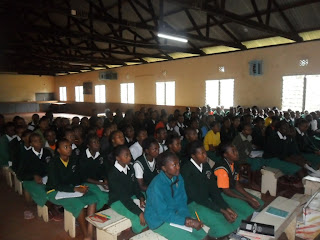Finally my “Sisterhood” project kick off last week on the 22nd day of January 2011 at Ruchu Girls High School located in Murang’a.Accompanied by the very able facilitator Miss Lilian Nyaga,we were well within time arriving the school at 8.10am on the bright Saturday morning. Having visited the school a couple of times to get the ground work in order we were ready to get things started…
It has been my general observation that the most impressionable teenagers in High School are in form two. (Usually aged between 14-16 years)Probably because of the newly acquired status in the school structure and the corresponding freedom that comes along with it. It is for this sole reason that we targeted this group to commence the project with. “Sisterhood” aims at empowering young girls to make informed decisions in all spheres of life. To do this we believe that constantly dialogue is key.
I believe that I do not have all the answers to all the queries this young girls may have for us during the next couple of months that we will be with them, but I know for sure that the mere fact that they know we are there for them without being judgmental will make a great difference one day. Joyce Meyer in her book “Teenagers Are People Too” correctly states that teenagers have the same needs as everyone else. For this reason, we choose not to ignore our young teenage sisters and instead prefer to encourage and guide them better.
Children learn what they live-if a child lives with criticism s/he learns to condem, the same is also true if a child lives with encouragement they learn to be more confident and if they live with praise they’ll definitely learn how to appreciate things. The beautiful young form two ladies certainly have big dreams for themselves as well, this is a great opportunity to mentor them and hearten them to pursue their dreams and goals.
“Sisterhood” aims to fill the gaps left by society. Our 8-4-4 system of education for instance is very book oriented but rarely life based. We deem it important to give these young girls life skills especially at this crucial stage of their development. Some teachers, parents and the church shy away from addressing the needs of teenagers. Peers and media who may fill this loophole often give misleading information.
All in all, I’m looking forward to making great friends with this amazing young girls am sure that very soon we’ll be seeing them in our court rooms, our medical labs and hospitals, in our lecture rooms among others….
 |
| Carol one of the Form 2's who wants to be a judge! |




